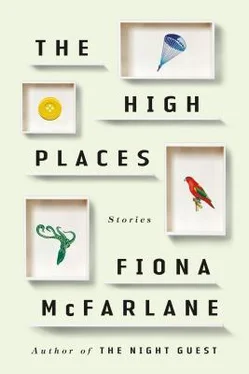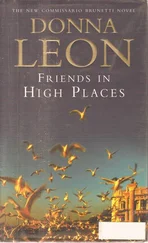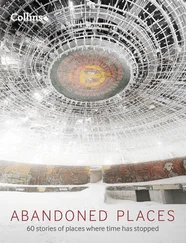* * *
The next day, after work, Kath was waiting for him at the hamburger place.
‘I don’t know what you think you’re doing,’ he said in a low voice, with a polite smile, as if someone might be watching them.
‘I stopped by for a bite,’ Kath said. ‘It’s a free country, last I heard.’ She was pert and proud. There was a new copper to her hair.
‘Suit yourself,’ he said. He ordered his hamburger at the counter, distracted, and Kath called out, ‘No onions!’ People turned to look at her, as they always did. He took a deep breath. ‘No onions,’ he said. Nothing wrong, he thought, with sharing a quick meal with a good-looking woman, a friend of the family. He kept his eye on the station for any sign of Ellie, although he had already walked her to the train and ushered her with tender regret (on both sides) to her Friday class.
‘You look … greenish,’ Kath said. ‘A bit green about the gills. You all right, Henry? Not eaten up by remorse, are you? Now that you’ve thrown away the best thing you ever had?’ Kath laughed, delighted at herself.
‘What’s all this about?’ His hamburger arrived, steaming. But the solitary pleasure of it was entirely lost.
‘I just wanted to know if you were off to the dogs tonight,’ Kath said. ‘I fancied it, is all. Fancied a night out with a friend.’
He had lifted his hamburger and now there was no putting it down. This placed him at a disadvantage. The thick slice of beetroot threatened to slide onto his plate — it purpled his bread and his tongue — and juice of some kind, silky with fat, ran over his fingers.
‘I’m getting married in two weeks,’ he said between bites.
‘Where’s the bride, then? Shouldn’t you be painting the town? It’s Friday night.’
There was something submerged about Kath’s face — something private and sly. Henry disliked it. It reminded him of how well suited they used to be; of how they’d both liked to cultivate a secret life to which they could make coy allusions.
‘She’s got a class,’ he said.
‘And you’re not invited?’
He snorted. The final bites of a hamburger were impossible in company; he abandoned them.
‘Take me to the track, then,’ Kath said. ‘We’ll go on a date.’
‘You never wanted to go on dates before,’ Henry said.
‘You never won the lottery before,’ Kath said, laughing, and two men at the counter looked over at her. They laughed too, and she seemed to absorb their approval and turn it back on them, brighter. The men watched as she put her hand on Henry’s arm. ‘You’re not a married man yet.’
Well, that was true, certainly. Kath smiled from her long immaculate face.
‘I guess I’ve missed you,’ she said.
They stood together and went out into the street.
The city was scrubbed and pale after the summer, and the buildings rose from the street with a mineral sheen. There was a leisurely rush on the pavements. Henry was aware, as he hadn’t been in some time, of the anxious thrill of Friday evening. He bought a copy of the Daily Mail .
‘I usually walk to Wenty,’ he said.
‘All that way?’ Kath showed him her heeled foot.
Henry liked the authority of hailing a taxi with a girl on his arm, and of getting into the back of it with her. Kath was wearing a short blue coat which drew attention to the bareness of her immoderate legs; Henry admired them, but with disapproval, as she stepped out of the taxi. Ellie was pretty in such a sensible way, but Kath required adjustments. She stood out on his arm. He and Ellie, he thought, stood out together. Ellie would be at her class by now. And here he was, at the dogs with Kath. Passing through the gates with this long girl at his side, Henry felt as if something had fallen over him: a soft cloak, maybe, made of silky stuff, invisible, that made him hot with knowledge and pride.
‘This feels like the Easter Show,’ Kath said, pressing him forward, lifting her face to the lights and the noise. ‘How do we make a bet?’
‘Over there,’ Henry said, and he pointed to the bookmakers, who stood under their umbrellas above the crowd, shouting, with their heavy bags strung around their necks. ‘You leave that to me.’
‘No,’ Kath said. ‘I want to know everything.’
Henry found it gratifying to teach her. She frowned at the racing form in the Mail , tracing one polished finger over the names of the dogs, creasing her forehead and saying things like ‘I like Young Lightning. He’s got a good feel to him.’ She paid no attention to all the other information on the form, so he ignored it too. Kath took a small gold pen from her handbag and as she bent to mark the dogs she liked the names of, Henry saw the darkening roots of her copper hair.
She held his hand and let him lead her to the bookies, and once there she scolded him for wanting to bet so little on each race. ‘For a man who talks big, you have no ambition,’ she said.
Henry was enjoying himself. He felt as if he’d been drinking; he felt the warmth of the crowd, of Kath’s body against his, of having money to spend. If Kath liked Young Lightning, he would put five pounds on Young Lightning to win. Henry knew he would lose. And Ellie, right now, was in a room on the northern side of the harbour, among all those pink Madonnas, those green Apollos. She would never like it here with the noisy dogs. She would ask the wrong questions, and she was sentimental: she would worry about the treatment of the greyhounds. Kath sat beside him on the benches, tense in her blue coat, and watched every race. Young Lightning fell in the sixth race, but Kath only laughed; Henry couldn’t care about his five pounds. This time last night, he and Ellie had been on William Street, at the hotel.
Kath turned to him and smiled. ‘These dogs love to run,’ she said. It was the right thing to say, and he kissed her mouth. The kiss was friendly and without conviction. She squeezed his knee with her left hand.
‘I’ll just pop to the loo,’ she said, and she went quickly, taking her handbag with her. Then it was as if she’d never been there, as if she were only a good feeling Henry had every now and then. He wondered how many of the men sitting on the benches around him were married. They leaned easy on their comfortable knees; they wore open coats and drank from brown bottles. He loved them, and everyone.
Henry turned around to look for Kath’s return and there was Arthur, freckled and ruddy under the lights, sitting higher in the stand with a paper folded over his knee. He was watching the dogs parade before the seventh race, and making notes; he wore the kind of flat green cap that Henry associated with butchers or publicans or plucky men down on their luck. Arthur gave no indication that he had seen Henry, but it was difficult to tell with a man like him, a man of winks and nods and innuendo, a man of showy discretion. Henry turned back to the track, where the dogs were filing into the starting traps, and Kath passed in front of him, one hand on his shoulder, to resume her seat. She wore fresh lipstick.
‘Who’ve we got in this one?’ she asked, inspecting the form. ‘Is this Rowdy Jack?’
Henry’s chest shook. He saw the future and Arthur in it, steering his mother by her happy elbow, smirking above the Victorian table, giving Henry quiet, confidential looks, tapping his nose, hating Ellie and wishing on the two of them a dull revenge. And in this future Henry saw himself in his mother’s house, always and only the lucky son of a lucky mother. An inheritor, before she was even dead. There was something indecent about it. He would be living in debt to his mother and to Arthur and to Ellie, and they would all make demands on him, and on this free and shouting life he’d given up: the bookies under their umbrellas and Kath beside him with her copper hair and lips. Generous Kath, who was his friend even now, was so quick and alert, and had never asked him for anything. And another life occurred to him, a life in which his wife came with him to the track and the rest of the week was happy Sunday lamplight, with a bed and newspapers.
Читать дальше












